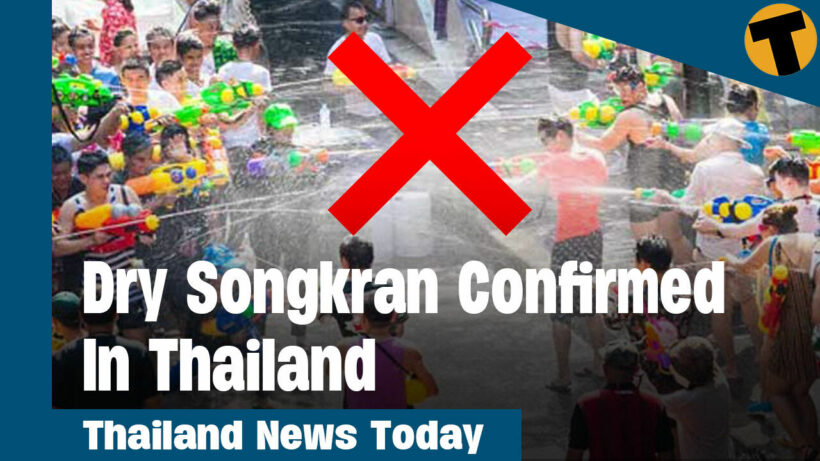Thailand News Today | Water fights are banned for Songkran this year

It might soon get a little easier to travel to Thailand. The government plans to scrap the pre-departure testing requirements for vaccinated travellers entering the country under the Test & Go and Sandbox schemes. A spokesperson says they are waiting for confirmation.
Under the planned revisions, a PCR test is needed on arrival and a self-administered rapid antigen test on day 5 of their stay in Thailand under the Test & Go and Sandbox schemes. This is according to the Ministry of Foreign Affairs spokesperson Natpahu, who gives the CCSA briefing in English. Plans to scrap the required PCR test before departure still need to be confirmed, he says.
The pre-departure PCR test, taken at least 72 hours before takeoff, has been seen as a deterrent to travel as many say it is not only inconvenient but expensive, especially for those travelling with children.
Starting April 1, those entering under the Alternative Quarantine scheme, which is open to both vaccinated and unvaccinated travellers, has been cut down to five days.
Travellers entering Thailand, with the exception of Thai citizens and returning expats, need a minimum health insurance coverage of 20,000 US dollars.
——
It’s going to be another dry Songkran. For the third time, water fights have been banned for the Thai New Year.
The holiday, which is April 13 to 15 this year, was celebrated with massive water fights with crowds shooting water guns, spraying water hoses, and dumping buckets of water on each other. Everyone gets soaked… but not this year.
The water fights and foam parties have been banned due to the ongoing Covid outbreak and Thai officials say only traditional Songkran activities are allowed, which includes going to temples, praying, and pouring water on Buddhist statues as well as on the hands of elderly people as a blessing. There are no restrictions on interprovincial travel, so Thais can still visit their families to celebrate the New Year.
The decision to ban water fights was made by the CCSA today during its general meeting chaired by PM Prayut Chan-o-cha. Under the guidelines set, traditional Songkran ceremonies at temples must abide by the government’s “Covid Free Setting” health measures. The public is asked to avoid celebrations in public places, like on the road. Other Songkran activities – as long as they are dry – can be hosted with permission from the government.
The CCSA also announced that powder is also banned during Songkran, a rule that had been set before the pandemic.
—
Restrictions are easing across Thailand as a number of provinces have been reclassified on the Thai government’s colour-coded zoning scale based on local Covid-19 infection rates.
Two provinces have been reclassified as so-called “blue” zones, which are open to international tourism, and more than 20 “orange” zone provinces have been reclassified as “yellow” zones with less stringent measures.
Chiang Mai and Petchaburi have been reclassified as “blue” zones to allow international tourism. Chiang Mai has had four districts approved to welcome overseas tourists, and local officials have been pushing for the entire province to be open to travellers.
—
Thailand’s mask mandate is still in effect. The Thai government considered lifting the mandate and discussed first lifting the measure at public parks, but PM Prayut Chan-o-cha said in a press conference today that the mask mandate will remain in effect.
The prime minister added that Covid is still a pandemic and relevant departments have been ordered to closely monitor the Omicron sub-variant BA.2.2, which was recently detected in Thailand.
Masks are required in public places in Thailand, and those who do not wear a mask can face fines, which can go up to 20,000 baht for repeated offences.
—
A leading health professional says Thailand should phase out the use of favipiravir, saying molnupiravir is a more effective Covid treatment.
Dr. Opass, from the Thai Red Cross Emerging Infectious Diseases Clinical Centre, says this will be essential as the country moves to declare Covid endemic. He added that the cost of molnupiravir produced in India is somewhere between 600 and 700 baht per treatment course, compared to 50,000 baht for the molnupiravir version produced by Merck.
However, earlier this week, Cabinet gave the go-ahead to ditch a procurement plan for 50,000 doses of molnupiravir, in favour of 17 million favipiravir pills and over 5,000 vials of the antiviral medication, remdesivir.
Opass points out that while favipiravir has been the main treatment of choice in Thailand, there is no clear data that proves its efficacy. By contrast, a recent study shows that molnupiravir is 30% effective at preventing severe illness in Covid patients. The medic is calling on the government to import molnupiravir from India and ensure all hospitals have adequate supplies, so it can be administered promptly to those who need it.
He goes on to say that certain categories of Covid patients are still at risk of severe illness, even if they’re fully vaccinated. These include people on immunosuppressive drugs, who need access to effective treatment. He adds that while new infections are expected to drop 2 – 3 weeks after the Songkran holiday, the virus still needs to be closely monitored.
—
A 26-year-old was arrested for allegedly blackmailing high school students which is believed to have led to the student’s suicide.
The man allegedly made a fake account online, identifying himself as a teenage girl and luring students into sending sexually explicit videos, then demanding money, threatening to release the videos. Police say they believe the man was targeting students from wealthy families.
The officers from Sarapee Police Station in Chiang Mai received a report about a 17-year-old high school student who committed suicide by firing himself with his father’s gun. In a letter found at the scene, it said he was stressed over financial problems, saying he was blackmailed and had to steal money from his family to meet the demands.
Officers checked the student’s phone for more information and suspect a scammer is a 26-year-old man living in Bangkok. The authorities from Thailand Internet Crimes Against Children raided a dormitory and arrested him on charges of using child pornography to threaten for money and benefits.
The Deputy Commissioner of the Royal Thai Police, Surachate Hakparn says he questioned the suspect, adding that he would interrogate further for more details on how many victims he has lured into sharing sexually explicit content.
Officers say they suspect the man is part of a gang that has blackmailed numerous students, targeting those from wealthy families.
—
The Pattaya News reports that the incident took place around 11.30 pm last night at the Tree Town complex, with a 58-year-old man, reportedly Irish, injured in the Security guards at a nightlife complex in central Pattaya are accused of attacking a foreign tourist in a dispute over a bill.
For their part, the guards claim the tourist refused to pay his bill and tried to flee. When they stopped him, they say he tried to fight them, then accidentally fell over.
According to a rescue worker at the scene, the unnamed man sustained a heavily bleeding head wound and was reportedly confused. He was given emergency treatment at the scene, before being transferred to a local hospital.
According to the Pattaya News, 2 Australian tourists who witnessed the incident, told police the man had been chased by a number of Tree Town security guards, who then got into an altercation with him. They report seeing the man fall and hit his head, but they could not say who started the physical altercation.
When questioned by police, 2 security guards stated that the man had refused to pay his bill and tried to flee the venue. They say they tried to stop him, then chased him and blocked his path, at which point he became aggressive and shoved them. They claim they responded in self-defense and as they were trying to calm him down, the man fell and hit his head.
Police have admitted they are skeptical of the guards’ story and will review security footage of the area. They also plan to speak to the Irish tourist once he has recovered, at which point, they will decide if charges need to be brought.
Latest Thailand News
Follow The Thaiger on Google News:


























